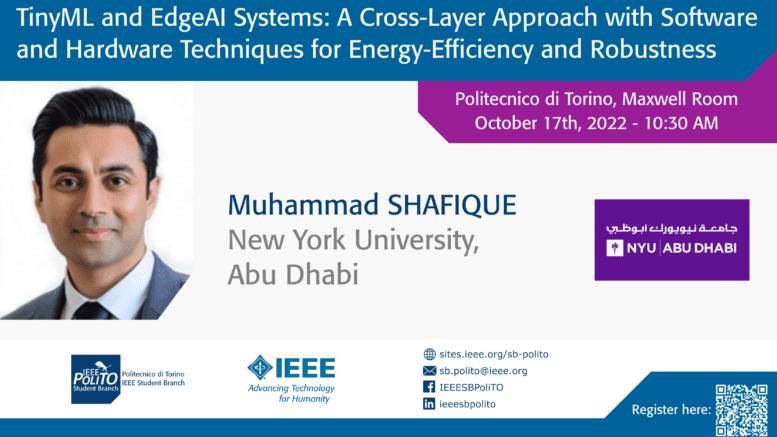17 October 2022 – 10:30 AM
Politecnico di Torino – Maxwell Room
Please, remember that registration is required to attend the event.
Abstract
Modern Machine Learning (ML) and Artificial Intelligence (AI) approaches, such as, the Deep
Neural Networks (DNNs), have shown tremendous improvement over the past years to
achieve a significantly high accuracy for a certain set of tasks, like image classification, object
detection, natural language processing, and medical data analytics. However, these DNNs
require huge processing, memory, and energy costs, thereby posing gigantic challenges on
building energy-efficient tinyML and EdgeAI solutions for a wide range of applications from
Smart Cyber Physical Systems (CPS) and Internet of Thing (IoT) domains on resource/energyconstrained
devices subjected to unpredictable and harsh scenarios. Moreover, in the era of
growing cyber-security threats and nano-scale devices, the intelligent features of a smart CPS
and IoT system face new type of attacks and reliability threats, requiring novel design
principles for robust ML. In my research labs at New York University (NYU) Abu Dhabi (UAE),
NYU Tandon School of Engineering (USA), and TU Wien (Austria), I have been extensively
investigating the foundations for the next-generation energy-efficient and robust AI/ML
computing systems, while addressing the above-mentioned challenges across different layers
of the system stack. This talk will present design challenges and cross-layer frameworks for
building highly energy-efficient and robust cognitive systems for the tinyML and EdgeAI
applications, which jointly leverage optimizations at different software and hardware layers,
e.g., neural accelerators, memory access optimizations, hardware/software approximations,
and hardware-aware NAS and network compression. These cross-layer techniques enable new
opportunities for improving the area, power/energy, and performance efficiency of systems by
orders of magnitude, which is a crucial step towards enabling the wide-scale deployment of
resource-constrained embedded AI systems like autonomous vehicles, UAVs, Robotics, IoTHealthcare
/ Wearables, Industrial-IoT, smart homes and cities, etc.
Prof. Muhammad Shafique
Muhammad Shafique (M’11 – SM’16) received his Ph.D. degree in Computer Science from the Karlsruhe Institute of Technology (KIT), Germany, in 2011. Afterwards, he established and led a highly recognized research group at KIT for several years as well as conducted impactful collaborative R&D activities across the globe. Besides co-founding a technology startup in Pakistan, he was also an initiator and team lead of an ICT R&D project. He has also established strong research ties with multiple universities in Pakistan and worldwide, where he has been actively co-supervising various R&D activities and student/research Theses since 2011, resulting in top-quality research outcome and scientific publications. Before KIT, he was with Streaming Networks Pvt. Ltd. where he was involved in research and development of video coding systems several years. In Oct.2016, he joined the Institute of Computer Engineering at the Faculty of Informatics, Technische Universität Wien (TU Wien), Vienna, Austria as a Full Professor of Computer Architecture and Robust, Energy-Efficient Technologies. Since Sep.2020, Dr. Shafique is with the New York University (NYU), where he is currently a Full Professor and the director of the eBrain Lab at the NYU-Abu Dhabi in UAE, and a Global Network Professor at the Tandon School of Engineering, NYU-New York City in USA. He is also a Co-PI/Investigator in multiple NYUAD Centers, including Center of Artificial Intelligence and Robotics (CAIR), Center of Cyber Security (CCS), Center for InTeractIng urban nEtworkS (CITIES), and Center for Quantum and Topological Systems (CQTS).

